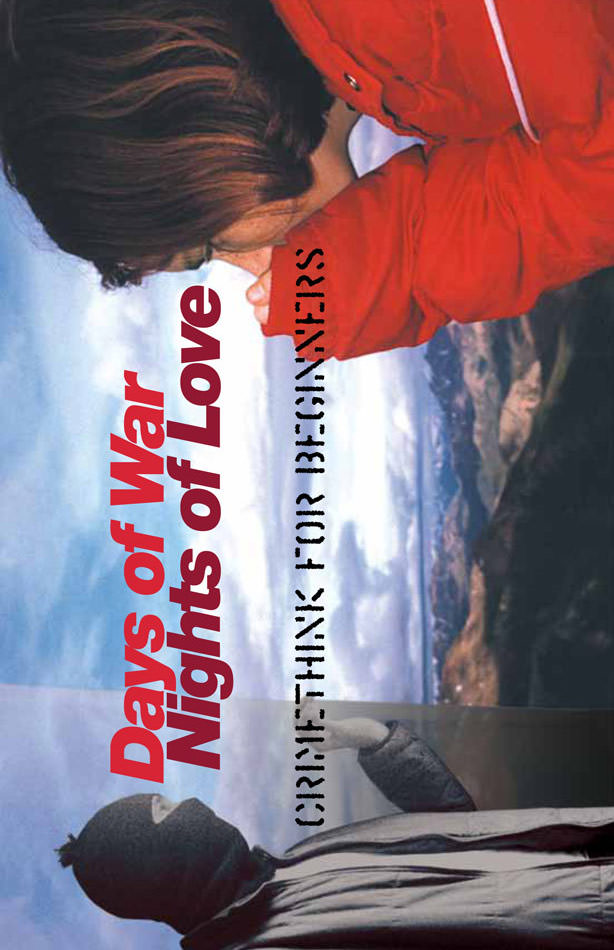At 292 heavily illustrated pages, our flagship book is the perfect size for any knapsack and the perfect reference manual for anyone seeking a life of passion and revolt. AK Press calls it “an underground bestseller,” but as it says in the preface:
“This book isn’t designed to be used in the way a ‘normal’ book is. Rather than reading it from one cover to the other, casting perfunctory votes of disapproval or agreement along the way, and then putting it on the shelf as another inert possession, we hope you will use this as a tool in your own efforts—not just to think about the world, but also to change it. This book is composed of ideas and images we’ve remorselessly stolen and adjusted to our purposes, and we hope you’ll do exactly the same with its contents.
“As for the contents themselves: we’ve limited ourselves for the most part to criticism of the established order, because we trust you to do the rest. Heaven is a different place for everyone; hell, at least this particular one, we inhabit in common. This book is supposed to help you analyze and disassemble this world—what you build for yourself in it’s place is in your hands, although we’ve offered some general ideas of where to start. Remember: the destructive impulse is also a creative one . . . happy smashing! “
Your ticket to a world free of charge.
See also: ne plus ultra edition
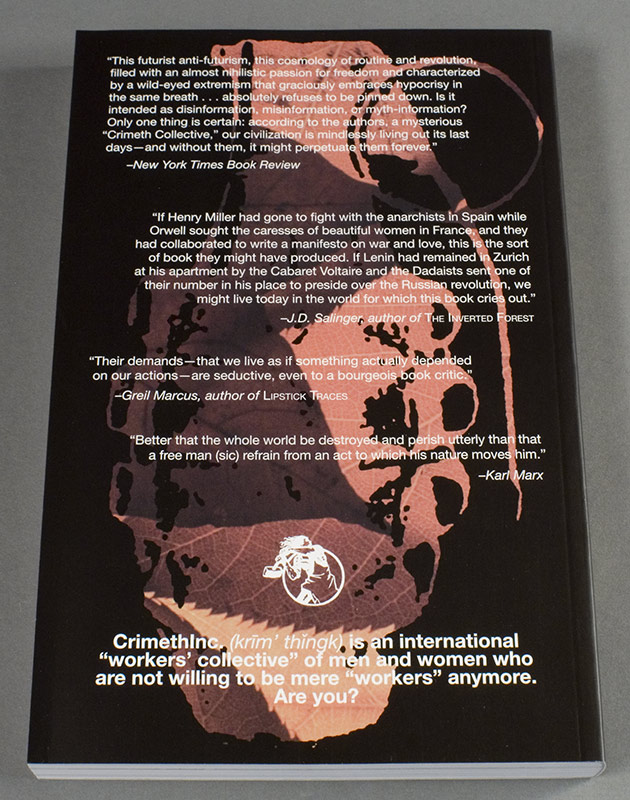
Gallery image #01 of Days of War, Nights of Love : Crimethink for Beginners
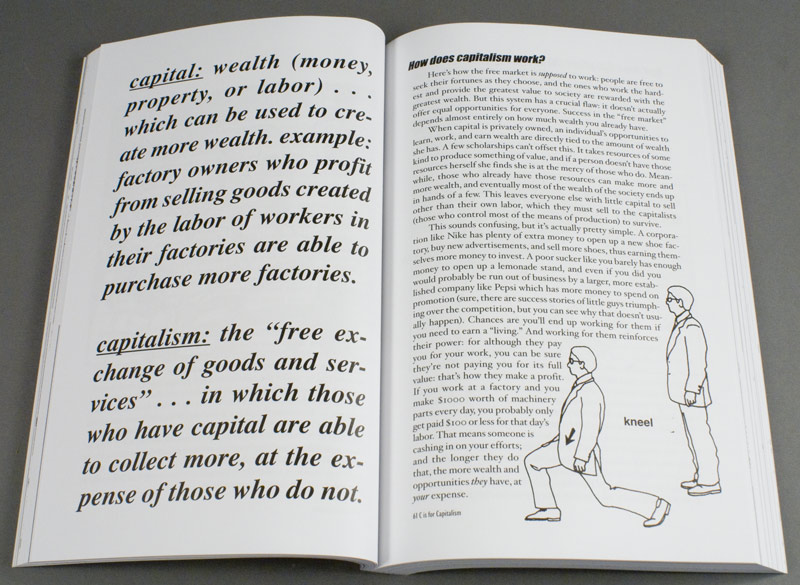
Gallery image #02 of Days of War, Nights of Love : Crimethink for Beginners
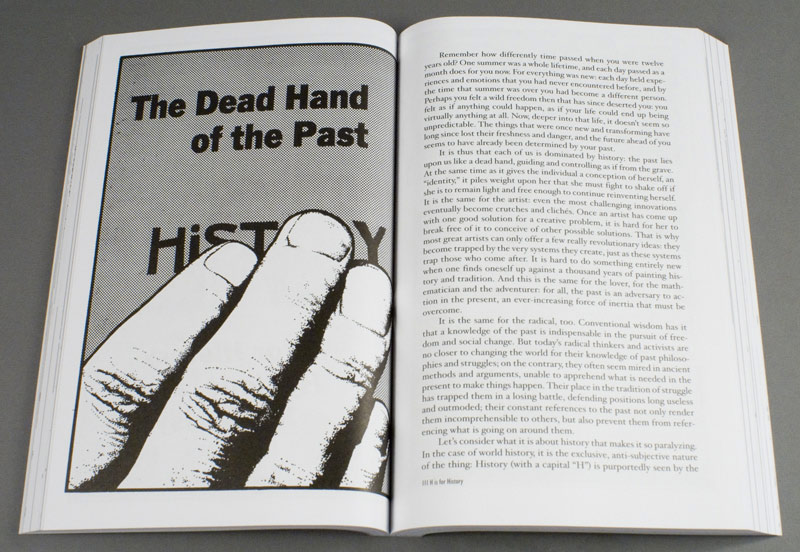
Gallery image #03 of Days of War, Nights of Love : Crimethink for Beginners
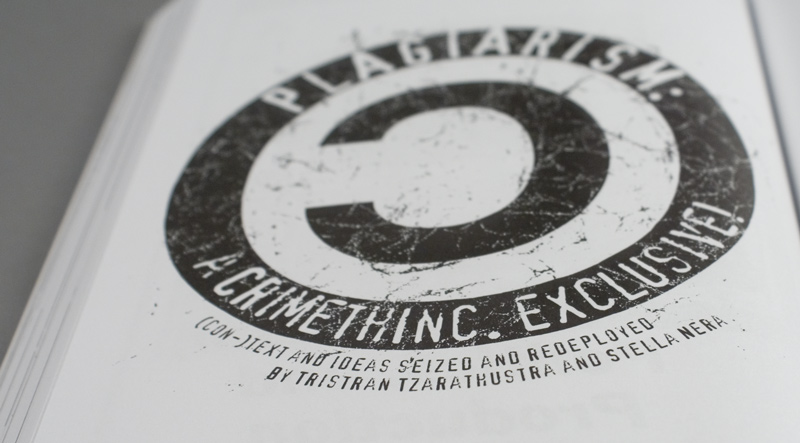
Gallery image #04 of Days of War, Nights of Love : Crimethink for Beginners
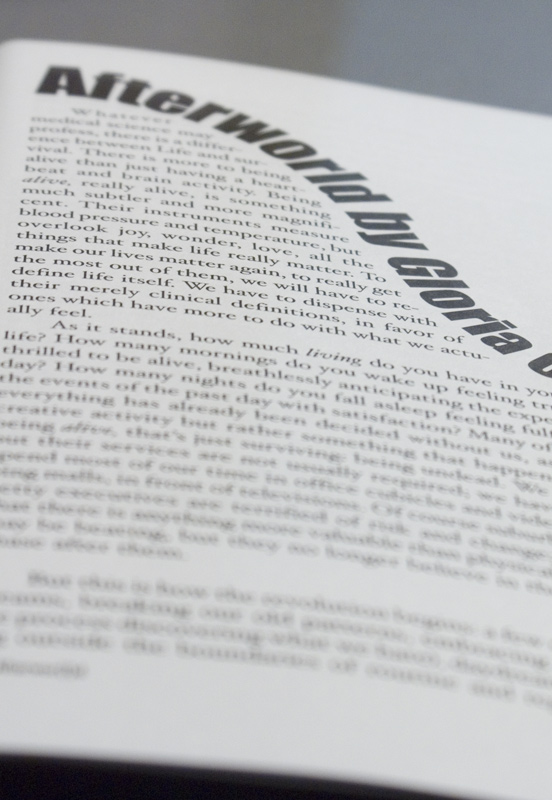
Gallery image #05 of Days of War, Nights of Love : Crimethink for Beginners
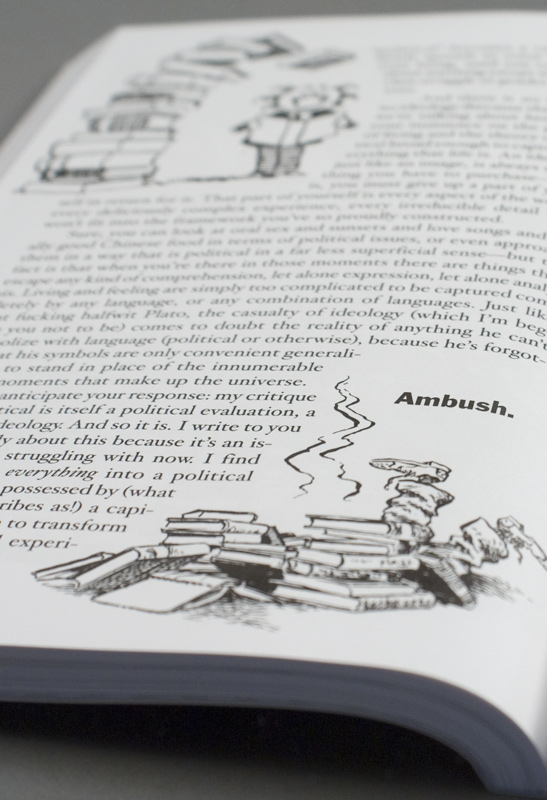
Gallery image #06 of Days of War, Nights of Love : Crimethink for Beginners
Reviews
A manifesto for building a new world that should be on the bookshelf of every idealist, student, punk rocker, worker and ex-worker, poet, and lover.
— Hodgepodge, issue #7, January 2001
Less of a novel and more of an exploded manifesto, this might be just what we need. Glorious, even for the most cynical reader. What more can we ask from a book?
— Clamor, issue #6, January 2001
Less of a novel and more of an exploded manifesto, Days of War, Nights of Love might be just what we need. It is the type of book you’d thumb through in the store and actually want to buy (or steal). Avoiding the “thin gruel of narrative,” the book instead gleefully mashed appropriated art pieces with personal testimony—reconfigured Frank Miller comic panels shout, “Face it, your politics are boring as fuck!” Whether you agree or not, there’s a refreshing quality to a book that offers the same amount of information to both the serious reader and casual browser, because despite steady sales of The Revolution of Everday Life and Nation of Ulysses CDs, most of us are still living lives that are frustratingly incomplete.
The past four centuries are all fodder for this new manifesto, everything—from the Unabomber to the Smiths, Henry Miller to the German J2M movement, Kalahari bushmen to Natural Born Killers—finds its way on the pages. Such voracious stealing from history and applying as needed becomes not just a practice, but a saving grace. By never labeling themselves punks or new Dadaists and instead stealing all manner of praxis and pranks, CrimethInc. remains elusive, avoiding pitfalls that toppled previous revolutionaries. Beloved nihilistic comic characters Milk & Cheese re-emerge as Soy Milk & Tofu to offer shoplifting as the true antidote to capitalism. the book is simultaneously tongue-in-cheek and as serious as getting up in the morning for work, yet avoids the inherent alienation of most historical and cultural texts (whose authors they dismiss as careerist historicizers”).
Topics range from anarchy to hierarchy, work to sex, alienation to liberation and technology, but every page burns with a passion for a freer life. Lies, exaggerations and blatant plagiarisms mix freely with passionate arguments. Nadia admits on page 171 that this may all “sound like anarcho-mystical academic nonsense (which it is of course—freedom cannot be understood except through mysticism!),” but the CrimethInc. workers do weave a good spell. Who disputes obvious, but unvoiced concerns like, “We pay rent before we live there a month. But we get paid 1-4 weeks after doing the work.”? Other essays walk a precarious line between arrogant and inspiring: activists are taken to task for being dull and guilty; radicals and artists as excrement peddlers, forever squirreling moments away for their next product. Too Harsh? Or a necessary critique?
The books vehement insistence that living is more important than art carries the argument beyond the typical debate. When you make it to the end, the personal testimonials about not working and the closing art pieces become an aria of voices urging you to close the book and live. Glorious, even for the most cynical reader. What more can we ask from a book? Whether or not you buy it probably depends on what you thought of the last Refused LP—revolutionary cannibals or well-dressed poseurs? Well-read former straight-edge kids or new messiahs? Don’t think too hard about it—the book warns from page one, ‘This book will not save your life; that my friend is up to you.’
— Clamor, issue #6, January 2001
‘This is how we have came to be the ones to fire the first shots of the third and final World War, the war which will be fought for total liberation.’ So the book begins, beautifully written and crafted— Days of War, Nights of Love breathes a vision of living life for every sunset and every star, for every kiss and for every brick thrown, not for consuming or buying and selling. This book tells a story of a future that is attainable only if we look to ourselves to create it, a life of living for the beauty of things, for living life like every day is your last. The writing is both poetic and inspiring, not only criticizing the world we live in today but also provides a broad vision of a more just and liberating world. It is broken up into various sections. Writings are on a wide variety of topics from sex to consumerism to theft to love to anarchism and hierarchy. It consists mostly of essays and writings from the free newspaper Harbinger, also put out by the CrimethInc collective. What makes it so complete is the beautiful layout and artwork that graces each page. Days of War, Nights of Love is arguably one of the most inspiring and liberating books that I’ve read in a long time, a book that I find myself going back to again and again, to suck the marrow out of it and collapse within its wonderfully crafted words. A manifesto for building a new world that should be on the bookshelf of every idealist, student, punk rocker, worker and ex-worker, poet, and lover. ‘And life is waiting for you with us, on the peaks of unclimbed mountains, in the smoke of campfires and burning buildings, in the arms of lovers who will turn your world upside down. Come join us’
— Hodgepodge, issue #7, January 2001
Wow! This is impressive! Every inch screams for you to pick it up. Close to 300 pages with new-school cut-and-paste layout. They broke it up into sections, each focusing on a different aspect of life; for example, W is for Work, G is for Gender, F is for Freedom, etc. It covers capitalism, media, love, left, death, anarchy, culture, sex, technology, history, politics, and so on. The writing is the usual CrimethInc. style—down to earth, direct, logical, passionate, and overflowing with kick-your-ass energy. It’s a new approach to older, dry academic anarchist theories and essays rewritten and added to, so as to hold relevance in our age and reality. The graphics are equal counterparts to the text, and some pieces have a strong similarity to the art used by the Situationists of the 60’s, taking comic strips and adding ironic political text. They strongly encourage the reprinting of any parts of the book which is always a rad “fuck you” to traditional copyright beliefs. Its the kind of book that after you finish reading it, you can’t get over to a friends house fast enough to recommend that they read it too and pass it on. It holds things that everyone needs to take to heart when pondering about life. So, enough of my recommendation babbling, get that eight dollars in the mail and get ready for this.
— Slug & Lettuce, issue #66, Winter 2001
Table of Contents
- Preface: What is a “CrimethInc.”?
- Foreword by NietzsChe Guevara
- I. A Short History of the CrimethInc. Workers’ Collective
- II. Important Documents: A CrimethInc. Contra-diction-ary
- A is for Anarchy
- B is for the Bourgeoisie
- C is for Capitalism, and for Culture
- D is for Death, and for Domestication
- F is for Freedom
- G is for Gender
- H is for History, for Hygiene, and for Hypocrisy
- I is for Identity, for Ideology, and for Image
- L is for Love
- M is for their Media, for Movement, and for Myth
- P is for Plagiarism, for Politics, and for Production
- S id for Sex, and for Space
- T is for Technology, and for Theft; and finally,
- W is for Work
- III. Conclusion: Anywhere Out of This World
- Afterwor(l)d by Gloria Cubana
- Bibliography
- Index
- About the Authors
